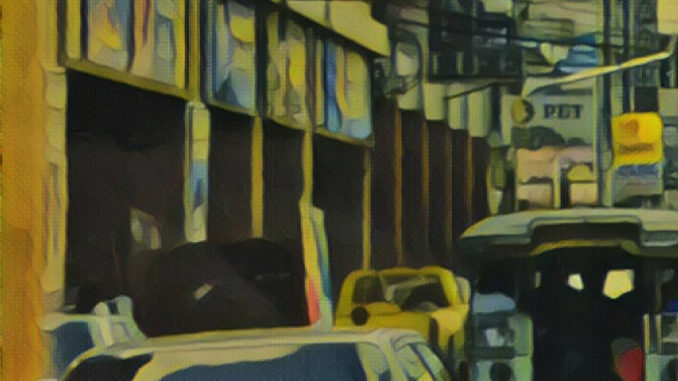
© Always Worth Saying, Going Postal 2020
Roberto rolled out of his hammock and felt the soles of his feet against a mud floor. He could hardly stand up. An empty bottle of local brew fell from him and bounced by his feet. His head swam. He was the luckiest man alive. The cool mountain air guarded him from the stink of the coast, even kept the mosquitoes and their diseases away. God was in his heaven and the Communists more than rifle range away. One day he would own his own land. Not amongst the Godless revolutionaries and lying foreigners but in the proper utopia promised by the apostles.
There was a commotion across the clearing. Another pointless meeting in the centre was causing a row. Damn this democracy. He took his machete from its nail on a beam that held up his leaky nipa roof. He’d been chewing jungle leaves as well as drinking. He swung his machete from side to side, describing a number 8, as if clearing the jungle for God’s purpose. Muslims, Marxists, goons, Protestants and drunks and leaf chewers, the list went on.
He was surrounded by them. He left his hut. There was a fire to the side of the centre, where there would have been a cockpit if it had been allowed. There were figures, dancing or fighting, by the light of the flames. Not for the first time. Roberto strode out, holding his genitals with one hand and swinging his machete with the other. The thought he heard a scream. He definitely heard a crack and a whiz from a hunting rifle. The noise rattled around in his head, held there by the local brew, an illegal foul-smelling yellow ooze, nothing like the grog he’d been used to at the coast.
Right. His mind was made up. This far up the mountain he was closer to God than anyone else on the archipelago. The clearing had suffered bad luck. It wasn’t fate, it was retribution. He was the most honourable man there. He had his suspicions about each of the others. He shouted his war cry and ran towards the centre waving his machete above his head like a saint’s pennant.
* * *
I’m in the city and I’m still looking for my contacts, the Cortez’s. I’m beginning to worry about my status there as an ungrateful Mayor Duterte appears to be taking all the credit for his election victory (and everything else) and squeezing out anyone he thinks of as a rival. I’ve been directed to have a chat with Father Conrad, at his Assumption parish church. I still haven’t found those missing girls, Johanna and Matilde. They say I was the last to see them and the deadline for me being blamed and hunted down by bounty hunters is getting worryingly close.
* * *
Assumption Parish church had no need for walls. It was never cold. When it rained it was stair rods, straight down. During a typhoon, no arrangement of walls and roof could keep the wet out. Metal grills could be rolled down between the roof columns but they were rarely used. There were always comings and goings. The Angelus was at sunrise, mass at the top of the next hour, rolling 24-hour masses on Sundays and Holy Days. There were also services that Misters, Jo’s, Sirs and Whites would never have heard of in the West. Goats and dogs wandered through the premises. Lizards hung from the roof. A gecko licked its lips.
A slogan above the altar proclaimed that, ‘The stone that had been neglected turned out to be the cornerstone’. An old lady beneath it tidied and prepared the altar. Her grand-daughter did likewise with the organ. There was sheet music and an overhead projector and slides of hymns to prepare. Beside the church was a square of rough ground. Uneven gravel remained, despite Fr. Conrad’s dream of a paved piazza and a handsome campanile. A large frog, poisonous, ignored by frightened cat, dog and roadkill smorgasbord collector alike, hid in the shade under a battered Toyota. Lack of winter meant that creepy crawlies just kept on growing. Ants were as big as mice; bats were like flying cats.
The biggest frog I ever saw was in a supermarket in Digos. Again, undisturbed by being poisonous, it just got bigger and bigger. Moreover, it was surrounded by shelves of food. My suggestion was that the air-conditioning should be turned up to max, until the smirking green thing hibernated and then starved to death. A lengthy and expensive process, never enacted, but in my defence, nothing else had worked. I gave the Toyota and its lurking gargantuan a wide birth and strode into the parish house.
I wasn’t expected, but visitors were. As the church had no need for walls, so the parish house had no need for a closed door. I sat on a bench in a hallway. Parishioners sat in a patient line, for an opportunity to lean towards Father Conrad and receive a blessing, advice or even the occasional admonishing hint of ways that needed to be mended. At the front of the queue, an old lady pressed a roll of dirty notes into Fr Conrad’s palm while she jammed a poisoned foot back into a sandal. He smiled and thanked her. She walked the length of the benches and stepped into the warming oven of the day. Everybody moved along one place.
The saints looked down on us from dusty frames on the wall. St Martin, sympathetic, St Augustine, features pinched as if interrupted while rowing with his mother, St Bernard, pained, recovering from a naked admonishment in a cave side thorn bush? All looked down upon me as, across a couple of hours, I shuffled towards my turn with Father Conrad.
When side by side, I was tall as him but not as rounded or as white-haired, and not carrying the beaked Roman nose that rose above those gentle lips that spoke God’s words in a soft Canadian missionary English. Neither was I carrying his years of experience in this place. His shoulders had bourn the founding of the parish, in near virgin forest, as families from other parts of the archipelago had flooded here when it was a ‘boom town’ thirty years previously. I leant forward and whispered.
‘I have some books, donated by Mr Victorio Cortez, who is a resident in this place. They are for the future good citizens of Davao City and of Utopia, an ideal community that I support, and as a colleague of Mr Cortez, I am obliged to deliver them. But of Mr Cortez, there is no sign.’
The prelate smiled, asked me my name and my province. He continued that it was wonderful that I was here,
‘Wonderful, wonderful, welcome,’ Father smiled, ‘Ah Victorio.’
‘Do you know of his whereabouts?’ I asked.
‘I can pass a message on, perhaps?’ Father Conrad offered.
He wore slacks and a white shirt. His badge of office was a large crucifix about his neck, hanging like a kitten nipped by the nape between its loving mother’s teeth. His shoes were local stout leather, of the type that his parishioners made. He seemed to be struggling with the heat, even in the tall corridor with its shuttered windows and ceiling fan which whirred rapidly above us. All doors were open, hoping for an arc of cooling breeze.
I told him that I must actually meet the Cortez’s, aware that I was pushing against the local custom that preferred generalities in conversation between strangers. I still lived in a world of times and locations, Father Conrad, a world of faith, where opportunities were taken by the grace of God. Too much planning might almost be a blasphemy.
As he dispensed mercy and truth from the altar, so he prepared to help pass schoolbooks around. Perhaps, as with the God of the scriptures, when he wrote his sermons on a Friday afternoon, Father Conrad was trying to interpret intention? I would give him a bit of encouragement. I opened a school book.
‘For the harmonious living together of different peoples, Father, especially ourselves and the Moro, allow me.’
I thumbed through the pages until I found a good section. I held the book, twisted it right open about its spine, and put it before him.
‘Look Father, let’s concentrate on the things we have in common, for the promotion of living together harmoniously’, I pointed at a picture.
Hellfire and damnation rained down from heaven, in rather a good cartoon, destroying the Sodomites, who scattered in all directions, arms akimbo, toothless, naively drawn mouths open in terror.
‘A story in both the Holy Koran as well as our Bible, Father, the destruction of Sodom and Gomorrah, something we have in common with the Moro. A story that helps to bring harmony, love and tolerance between peoples.’
From the unread comments, I realise that some of you think this narrator’s humble memoir is slightly exaggerated, even a ‘tall tale’, ‘ripping yarn’, ‘shaggy dog story’, or even a fantasy concocted while selling ice cream in the South of France. The next few paragraphs are one hundred per cent canonical. I am prepared to swear on a pile of Korans, Bibles and schoolbooks.
There had been a competition in the Cortez’s schools for the book’s illustrations. The children had had a great time. We were keen to get the Muslim schools involved too but they were iffy about allowing children to re-create the human form. They drew some good buildings and farmyard animals instead. Including the farm where the virgin birth of Jesus had taken place, a story also in the Koran. But I must say, dear reader, perhaps predictably, in much the same way that Mayor Duterte tended to take the credit for everything, the Muslim children made the cattle stalls and mangers look a bit like a mosque.
The winners had been invited up to Metro Manila on a bus trip, for sight-seeing and a trip to Dane Publishing. Confusion reigned. We certainly didn’t trust them with the proofs or the completed books, so I flew up separately with the artwork and copy and would bring the finished books back down. As regular readers may have noted I was somewhat distracted by events in MM and by the time I got back to Davao City, the lie of the land had changed rather dramatically, and not in my favour.
This was in the days when I thought that Dane Publishing’s address (at Tandang Sora) was at ‘tanda ng sora’. This means something else and isn’t meant to be taken literally anyway, as it is someone’s name. Before the days of SMS, (invented by a Filipino at our Computer Club, no matter what you’ve heard) messages went back and forward by little paper notes or booked and unpredictable landline calls, or a cousin’s, cousin’s uncle’s neighbour being dispatched on grandpa’s motorbike with a ‘Chinese whispers’ style instruction.
When I eventually rendezvoused with the coach party, I was sweaty, exhausted and grumpy. Asking Miss Cortez how the journey had been, she replied ‘Fine, good’, at which point I felt obliged to point at the (absolutely literally) blood and bits stained front of the bus. Oh. Unfamiliar with the roads, and having to drive long hours, they’d accidentally killed numerous living things, including people, on the way up. Charming.
Back in the parish house at the front of the queue, I’m listening to Father Conrad,
‘The Cortez’s love the young people. They supported Our Lady of Fatima Academy but it is closing now. And the Holy Crossians, Miss Cortez and her siblings are Holy Crossians. She has a love for the poor, and a conscience for them. Perhaps Holy Cross of Agdao would benefit from the books?’
Having dispensed, he must now motivate his listener to action. It was one of those do-it-yourself moments reserved for the end of sermons.
‘You must tell the Holy Crossian’s that Assumption Parish is praying for them, also Mother Theresa’s nuns, you must mention us to them. There are nuns of Mother Theresa’s order in Agdao, you know.’
Father Conrad sent me on my way with a blessing, his fingers raised as a Roman emperor, administered before I could object. Particularly, one might object to being sent to Agdao which was, believe me, one of those ‘mixed’ blessings. Friends in uniform tell me that being in the same place at the same time as BBC war correspondent Kate Adie was a never a good sign, likewise the presence of Mother Theresa’s nuns always suggests a big problema or three.
As I made to stand, the bench shuffled along one. A dark-skinned man reached into his sack for a shrivelled vegetable to present to the Father. I strode past the Toyota and the sheltering frog. Bolt upright, I marched through the church, between the pews, and attacked the slight raise on the way back to my office and room at the Durian building. The heat was beginning to sear. I slouched, meandered, walked randomly through rough streets between the little homes, between palm trees and telegraph poles, massed at their tops with those Gordian knots of wires.
I gathered my courage. Agdao was a dangerous, ‘critical’, part of the city. Even Father Conrad appeared to have joined a long line of people trying to get me killed. Thank goodness for my Utopia. I would strike out there, and find those girls, as soon as I’d made that delivery to Agdao and had the protection of the Cortez’s again. I happened upon the main road, within sight of the roof the Victoria Mall, next to the Durian. I strode alongside the road, ducking beneath advertising hoardings which jutted out over the open gutter and patchy kerb. The road was busy now, taxis and jeepneys, trucks and appliances. Too busy to cross for the Durian building, I had to close my eyes and step out into the traffic, trusting the drivers would make an effort to miss me.
It was siesta time. Wary of being interrupted again, I hung a ‘do not disturb’ on my door handle, locked myself in my room, bolted it, tied the chain up and propped the wicker chair against the handle. I fell asleep on my bed, surprisingly relaxed. At least I could have a few hours uninterrupted. Wrong again.
This time there were two of them. They didn’t even wait for me to wake up. They stood beside the bed shaking my pillow, rattling my head until I sat upright. One was armed and in uniform, a security guard. The other was the hotel’s impossibly handsome duty manager. They stood there like a housemaster and a matron waking a prep schoolboy in a dormitory with some sudden, tragic news from home. Things had just got worse, unimaginably, unexpectedly, bolt from the blue, worse. One envied the not-so-good people of Sodom and Gomorrah, at least God and Allah, via the rumblings from the heavens, had given them a bit of a warning.
To be continued……
For a recap of the story so far, please click here.
The Goodnight Vienna Audio file
Audio Player



